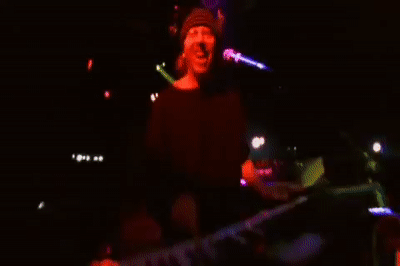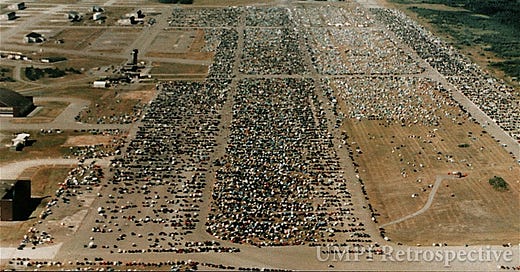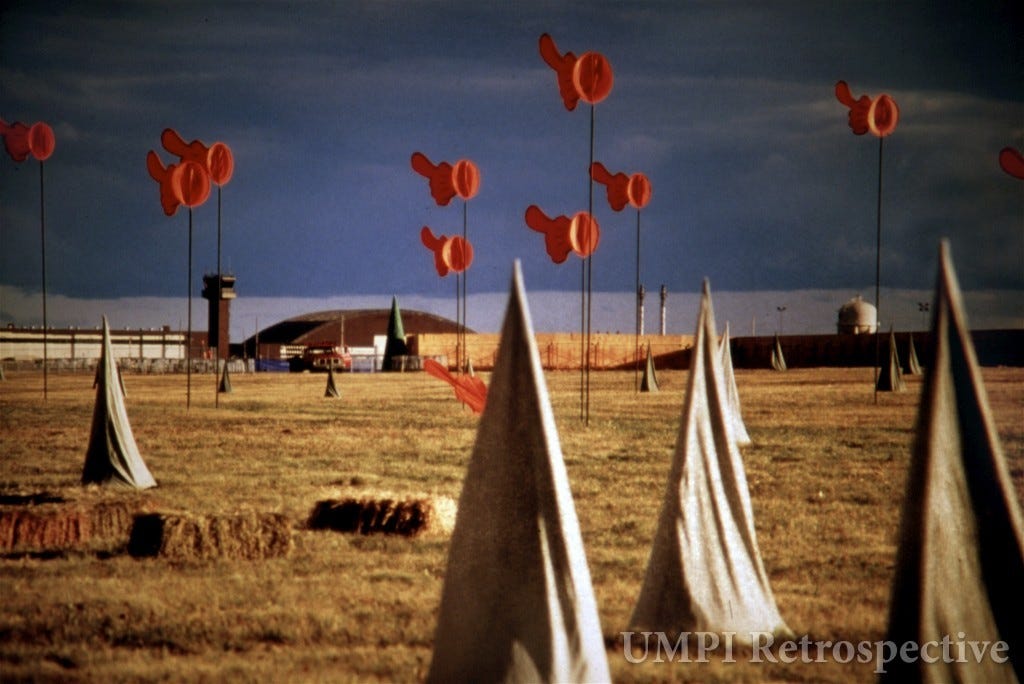SET 1: Makisupa Policeman -> Harpua > Chalk Dust Torture, Theme From the Bottom > Punch You in the Eye > Ghost > Ginseng Sullivan, You Enjoy Myself > Train Song > Character Zero, The Squirming Coil
SET 2: Wolfman's Brother -> Simple -> My Soul, Jam -> Slave to the Traffic Light > Rocky Top > Julius
SET 3: Halley's Comet -> Cities -> Llama > Lawn Boy, Limb By Limb > Funky Bitch
ENCORE: Contact > Loving Cup
A year after the good vibes and celebratory triumph of The Clifford Ball, its successor, The Great Went, flirts with darkness. Its name comes from one of the most overwhelming scenes in Twin Peaks: Fire Walk With Me, which is up there among the most intense movies ever made. The festival’s central performance piece was a collaborative sculpture built by the fans and the band all weekend…then burned to the ground at the end by a giant match in an act of ritual arson. In Todd Phillips’ Bittersweet Motel, The Great Went scenes feel tense compared to the idyllic Clifford Ball footage, including one of the film’s most uncomfortable moments: the campground bros.
Immediately preceding that infamous scene is another that made Phish fans squirm in their theater seats. Just as Page is walking off after a gorgeous sunset Coil solo, a hot mic catches Trey lambasting the band while they shuffle back to their backstage tent. “I thought it was the worst set we played in six months,” he says, “I don’t know what the fuck was going on…we weren’t doing anything like we normally do, we were playing like shit.” Fish, at least, seems to take it in stride and agree, but we can’t hear or see the body language from Page or Mike on Phillips’ camera, which eavesdrops from outside, reality TV-style.
I recall that scene as pretty shocking when Bittersweet Motel finally came out in 2000. By that point, Phish had instituted their rule of not discussing sets and shows, and here was pretty clear evidence of why that was a smart move for the band’s longevity. But despite Trey’s passive-aggressive banter after Chalk Dust (“That was kind of like the soundcheck there, because we didn’t get to do a soundcheck.”), I don’t think anyone thought that the first set of The Great Went sucked – far from it, in fact.
But I can empathize with some of the pressure Trey was feeling to deliver on that day. The Great Went had the pressure of all hotly-anticipated sequels – it had to live up to the beloved original, but also offer more than just a replica. It was enough for the music at The Clifford Ball to be just okay, as the mere experience of getting 70,000 or so Phish fans in one place for the weekend was euphoric for all involved. But if the Phish festival was going to become an annual tradition, and was going to take place in a far more remote location (Limestone is north of Quebec City!), the band could only rely so much on increasingly-complicated art installations.
So the first day of The Great Went onstage becomes a matter of Phish trying to figure out what an iconic “Phish festival” set should sound like. Over the course of four hours (five if you count the late-night set), the band tries out three different ideas, none of which quite nail the concept. That will change on Day 2, but for today, like the “Tower of Art” taking shape just outside the concert grounds, it’s still a work in progress.
The first set gets off to a weird start. Whenever Phish opens with Makisupa Policeman, it’s usually a commentary on some shady biz going on outside the show, which is strange messaging when the band created the venue they’re playing in. Then they finish off the Clifford Ball Harpua, a fun move on paper that’s also a reminder of the kinda sour note the last festival ended on. Chalk Dust is a slopfest, provoking Trey’s soundcheck snark; if the set stopped here, Trey’s rant would be easy to parse.
But after his comment, they play a tremendous Theme where Trey essentially writes his part in What’s The Use? in real time. That’s followed by a PYITE with a long, crunchy intro, a Ghost that’s a little keyed-up by the big crowd but leans into that aggression, and a YEM that stays pretty straight until an unsettling last few minutes (and a very short vocal jam).
Then the set…just keeps going. YEM would be a natural set closer 90 minutes in, but they play Train Song, then Zero, then Coil. In light of Trey’s comments, maybe he didn’t feel like he had given the fans enough, so he kept looking for that exclamation point. But it balloons the set out to 115 minutes – almost as long as the entire Tinley Park show a week earlier. What’s more, they’ve already burned Ghost and YEM – two of the summer’s unequivocal highlights – before the sun even set on the first day. It’s a smorgasbord of Phish, when they still have five sets to fill…a marathon, not a sprint.
After Trey’s “pep talk,” the second set doesn’t repeat that error, getting right to the point with a sequence that might be the night’s finest. The Wolfman’s doesn’t repeat the hyperactive pace of Ghost and gives New Englanders their first taste of true, sparse cowfunk; it’s the jam that inspires Trey’s famous “that was so funky it was almost as good as James Brown on his worst night” joke in a much cheerier post-set debrief. The brief Simple jam provides some outstanding Trey faces for the documentarians, and even My Soul can’t kill the vibe, with quirky jams on the way both in and out. But after a triumphant Slave, they’re stuck with the opposite problem from Set 1 – an excellently-paced and flowed set, but only 55 minutes long. So they tack on a vestigial Rocky Top > Julius just to get past the hour mark.
Set 3 also starts strong with a string of rarities: the first jammed Halley’s since Binghamton ‘95 (and its first performance of any kind in exactly a year), a slick segue into Cities, and a drag race into Llama. There’s a spontaneous energy building through this trio that’s very reminiscent of some of the great early-summer sets from Europe — your 6/25 or 7/2 or 7/10 — and I’m sure Phish would have loved to export that freeform experience to their grand finale. But the kind of freedom you get in a 700-person club can’t be replicated in front of 100 times more fans, and Phish has a fireworks show ready to launch, so they rein it back in with a Lawn Boy, a lengthy Limb By Limb, and a Funky Bitch to accompany the pyro.
There’s a fourth way for Phish to create a unique festival experience, and it’s on display at 2am on a makeshift stage near the entrance to the concert area. There, MC Neoncellgap, Groomed Ink, DJ Heavy P, and DJ Lemore Lalip put on an all-electronic set that…well, okay, maybe the less said about it the better. The “disco” set – which is not disco at all, but sounds like the kind of bad IDM/chipcore that circulated on CD-Rs in the early 2000s – was a big swing at building upon last year’s magical flatbed jam. But the execution is the rare case of the band reaching too far out of their comfort zone; they’d find a much better form of cybernetic Phish 14 years later in the Storage Jam.

Somewhere in these five hours is the right mix of ingredients to produce a truly special set that could only be heard at Phish’s annual makeshift civilization. A couple big jams, a fan-favorite bustout or two, some new experiments in sound, organized narratively and in no rush to beat curfew. But on the first day of The Great Went, the variety of options and the sheer size of the canvas available throw Phish off their game just enough to get a scolding from their leader. The combination of high standards and loose creativity can be a tough contradiction to crack, and while it’s easy for Trey to say “Why be nervous, it’s our own thing, everybody’s here,” it’s a much harder thing to execute.
[Thanks to the University of Maine - Presque Isle photo archive for the amazing shots!]







While it reflects the earned triumphs and maturity of the sounds developed at the Europe shows and the shows earlier in the tour, I always think of the Great Went as the true launch point for Fall 1997. Relaxed & patient... playing with timing and various sounds dynamics... you can hear the future in a lot of the jams this weekend. Phish was cresting.
Even though my opinion of this one is far more favorable (show #4 for me, so attendance bias maybe), great write-up per usual!
Re: the choice of Makisupa to open, I took it as a nod to them taking the stage that day at precisely 4:20pm. Sure, even at that point a 420 reference would have been cliche and juvenile, but Makisupa’s always been very tongue-in-cheek about that kind of thing (hell, just go back nine months and a day).